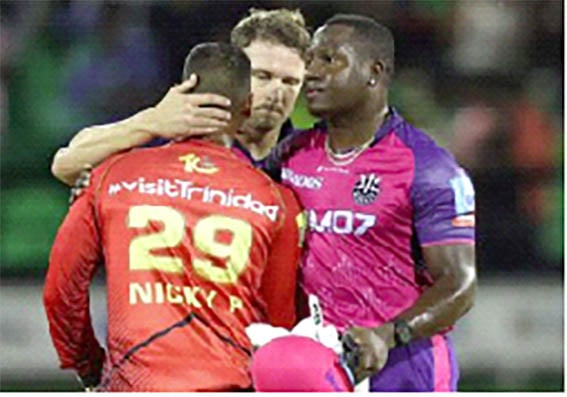By Fazeer Mohammed
(Trinidad Express) Officials of the Caribbean Premier League (CPL) will never admit it but all that seething rage and unrestrained cussing triggered by last Tuesday night’s bizarre finish at the Guyana National Stadium would have been music to their ears.
Isn’t it obvious why? To get the CPL at the top of the 7 p.m. news and then on the front pages the next day means that the Trinidad and Tobago public, even those—maybe especially those—who could care less about West Indies cricket, have attached themselves emotionally and unconditionally to the Trinbago Knight Riders.
And while it is unlikely that we will ever get a satisfactory explanation for the events which contributed to TKR’s elimination at the hand of the Barbados Royals, the depth of feeling here over the curious timing for the return of power to the floodlight tower at Providence confirms that this 21st century franchise format of the centuries-old game is already woven into the fabric of the T&T sporting tapestry.
By the way, as much as the events as they unfolded appear highly suspicious, there is no way to say definitively that this was a conspiracy to knock Kieron Pollard’s side out of the competition. Fans and even some media practitioners unhinged from the tenets of responsible reporting would have crossed that line long before David Miller hit the winning six for the Royals, while the CPL administrators did themselves few favours in issuing a formal statement more than 24 hours after the event. But again, they would have assessed Trini culture and, by extension, the Caribbean way of doing things to be confident that it is something they can ride out in an environment where the attention span for any issue in the public domain is barely a week. This is really nothing new for those who have taken the time to assess the history of the CPL.
It all started in 2013 with Trinis getting on bad before even a ball was bowled because they felt the abandonment of the nation-based Caribbean T20, which had its final event earlier that same year, was another conspiracy by other jealous West Indian territories and their scheming administrators to mash up Trinidad and Tobago’s dominance, especially as they had just completed a hat-trick of titles.
Yet in a manner that perfectly reflected Jack Warner’s “yesterday was yesterday, today is today” statement of the football World Cup qualifying campaign in 2005, the ink had barely dried on the media expressions of discontent with the new T20 cricket arrangement than fans were packing the stands at the Queen’s Park Oval for every night of the home matches of the Trinidad and Tobago Red Steel (as they were known then) and then again for the semi-finals and final, even though the steel had melted in the semi-finals and Chris Gayle’s Jamaica Tallawahs lifted the inaugural title at the expense of Ramnaresh Sarwan’s Guyana Amazon Warriors, who had four Trinis—Sunil Narine, Denesh Ramdin, Lendl Simmons and William Perkins—in their line-up.
So riding out this floodlight controversy is hardly a challenge worth worrying about. Of greater concern though is the long-term sustainability of the CPL model which has lost money in all of its previous 11 seasons. Significant investment from the billionaires at the heart of the Indian Premier League, which is why TKR, the Royals and St Lucia Kings are so re-branded, has been a financial lifeline.
But in an increasingly crowded space where franchise tournaments are either overlapping or running concurrently, the self-proclaimed “Biggest Party in Sport” will find it increasingly difficult to attract the biggest names in the sport moving forward.
There is no question though that CPL has won the public relations battle, so much so that many in the game, who have played the game and who have covered the game are either buying into it wholesale or remain hesitant, for whatever reason, to challenge an obviously bogus narrative, which is that CPL has redounded to the benefit of West Indies cricket.
Again, just to be clear, the claim is that the CPL has benefited West Indies cricket, as distinct from benefiting West Indian cricketers. So let’s look at the facts of senior West Indies men’s cricket on the international stage. West Indies are bottom of the current World Test Championship table, failed to qualify for the 50-over-a-side World Cup for the first time ever, failed to qualify for the last Champions Trophy in 2017 and will also miss the next edition in Pakistan early next year, while in the T20 World Cup (most relevant given the CPL format), the two-time champions’ best showing in the last three editions was getting to the Super Eights in the Caribbean four months ago.
To ignore that stark reality amid the festivities and controversies, well, that must count as a big win for the CPL.









